Posted by NiftyMarketing
This post was originally in YouMoz, and was promoted to the main blog because it provides great value and interest to our community. The author’s views are entirely his or her own and may not reflect the views of SEOmoz, Inc.
I am slightly shocked and simply amused that the recent Google Venice Update has largely flown under the radar. The Inside Search Blog published a list of 40 some-odd changes to the algorithm for February, and it seems that Panda 3.3 and the mysterious one liner about link valuation captivated most of the SEO and Inbound world, but what caught my local attention was this…
“Improvements to ranking for local search results. [launch codename “Venice”] This improvement improves the triggering of Local Universal results by relying more on the ranking of our main search results as a signal.
"Improved local results. We launched a new system to find results from a user’s city more reliably. Now we’re better able to detect when both queries and documents are local to the user."

The Update
Simply put, the Venice update localized organic results on broad search queries. Got that? If not, here are some examples…
The Results
Search “Divorce Attorney” with location set to United States.
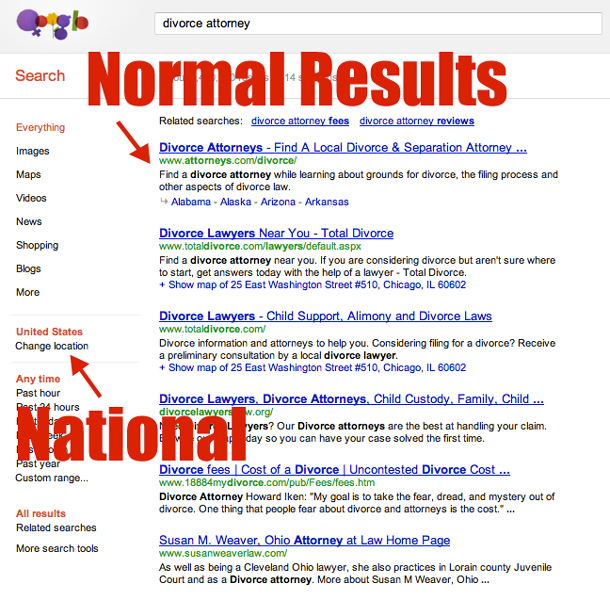
Search “Divorce Attorney” with location set to Las Vegas.
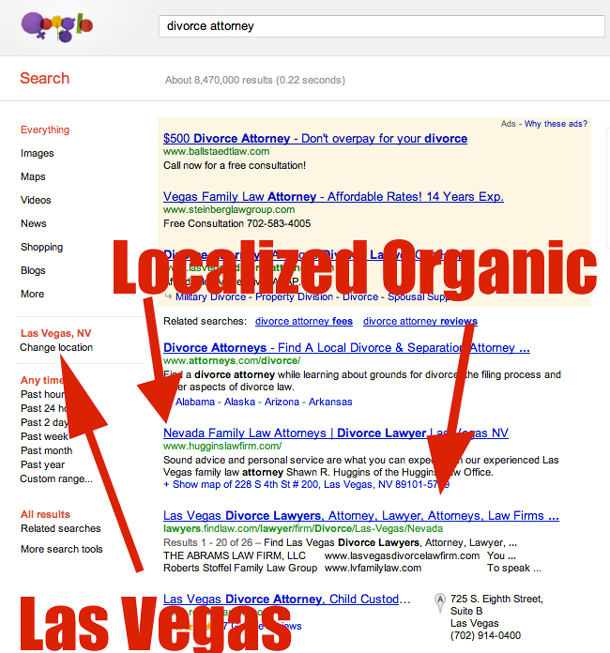
Search “Divorce Lawyer” with location set to Chicago.

I know what you're thinking…. “Of course they did that on the term divorce lawyer. It’s a super localized search phrase. Unless a person has spouses in multiple states that is.”
But look at this SEO search query…

It is clear that finally 2012 can be declared the year of local. With Google Places localized results + Google Organic Localized results every company needs a localized plan weather you have a single location, multiple location…or no locations at all because the national SERPS just got a lot more crowded.
The Plan
Step 1: Analyze the localized results on your queries.
A wise man once said, “If you can’t beat em, join em.” This is my favorite applicable SEO quote as generally the people who are outranking you are doing something that you SHOULD be doing. This is definitely the case with the Venice update. Here are the common elements that I see these localized sites have…
- Local Landing Pages: Findlaw.com doesn’t have a physical address in Las Vegas. But they sure do have a landing page for it located at URL below. You might need an address to play in Google Places, but not in the organic league.
http://lawyers.findlaw.com/lawyer/firm/Divorce/Las-Vegas/Nevada
- Title tag and description: Location + Keyword. This is pretty basic information but crucial in ALL cases that I have seen of localized organic results.

- Localized Page Content: Usedcars.com makes good use of Header Tags and site content focusing on the Las Vegas market and different types of cars. While cookie cutter content, for now this is doing the trick for them.
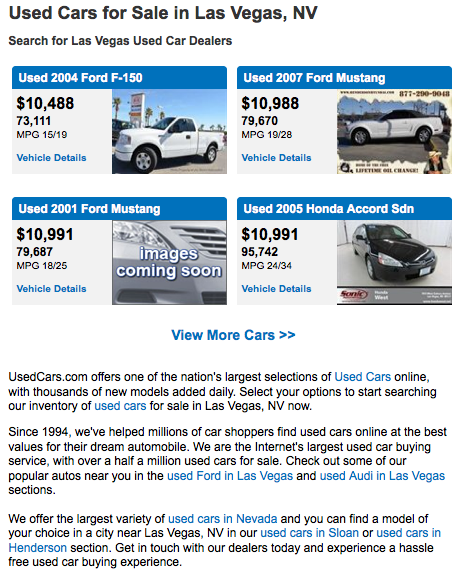
- Local Link Profile: Look at one of the high ranking localized results on the term “divorce attorney” with the location set to Las Vegas using opensiteexplorer.org.
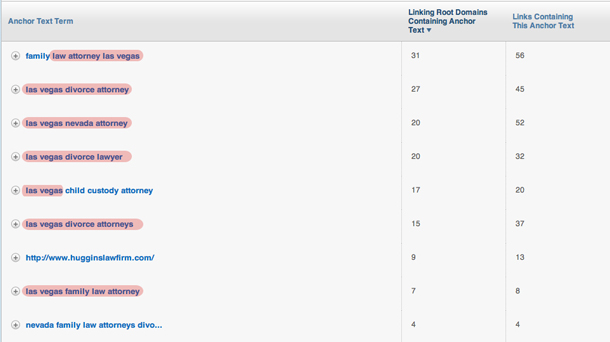
Not exactly the most “natural” looking link profile but extremely effective in beating the localized filter in this case. A large percentage of the links have the term “Las Vegas” listed and for small sites that don’t have the overall authority of large sites, this seems to be the common trend.
Step 2: Do way more than the competition.
There is a common trend with companies that do well in the SERP rankings…they do more than the competition. These tactics will help you go above and beyond….
- Site Architecture: Getting 1000’s of pages indexed has just become a reality that all national players need to re-examine or they won't be able to compete with localized results. How can you structure your navigation to get that juice to your local pages? Your home page might not have a chance to rank any more. Unless you are the top 1-3 National organic results. Most websites I have seen haven’t put value on localized pages compared to product pages. Get busy rethinking.
- Unique Localized Page Content: This is the true issue with localization. Most sites have cookie cutter content that might rank for locations, but it also might lead to a nice Panda slap for duplicate content. I would not build content and just replace the location information. If you are still doing this you are playing on dangerous grounds. Scaling localized page content is not easy, not very fun, and definitely not sexy. So, the companies that can make it easy, fun, and sexy are going to be the clear Venice winners.
Here are some ideas:
1. Location based reviews – Instead of one testimonial site wide add a testimonial in every market you can. It helps to sell the “locationalism” to the searcher and it’s content that doesn’t have to be written by you… just gathered.
2. Gather “Why I love my city” user generated content – Ask customers to write up information about their local city and why they like it. It’s unique and fun to read.
3. Write out directions to each location – Have you ever heard people tell directions the same way? No chance of duplicate content with directions…ever.
- Markup Addresses in Schema and hCard: This has become a favorite practice of mine and I am shocked that there are so few doing it. Use schema-creator.org and microformats.org to markup your address and business information. This helps send a very clear signal to search engines of your location and could be a factor in getting a +box.
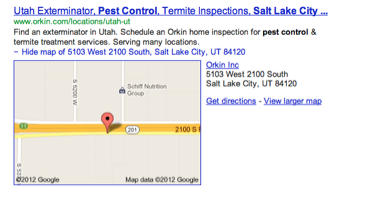
- Add a KML File and GeoSitemap to your website: By far the most under-utilized tactic that will go the farthest with this update. A KML file is used to determine the exact address and latitude/longitude of a company. It’s like a location dog tag for your website. You can create one with this tool Geo Sitemap Generator. Here’s a diagram of how they work…
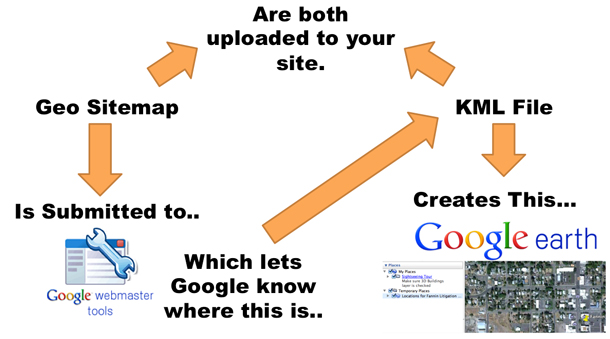
- Authoritative Local Link Building: It is easy to blast local links with article marketing, commenting, forum link building, and other basic methods to your local pages. But achieving authoritative local links take some serious work. Here are a couple tactics that will go a long way.
1. Microsites: Build microsites for the submarkets of a large city. Put detail into making these sites unique and useful though small. Focus your link building efforts at these sites and then use brand + location + keyword targeted anchor text pointing back at your main site. This approach gets you authoritative links from sites that are in the same business and market that you are…and you own the site.
2. Local Guest Posting: Find hyperlocal blogs in your city. They are usually desperate for good content from locals. You don’t necessarily have to write about your industry though it would be nice to have the information semi-related. The main thing is using the author box to let people know you are a “location + keyword”.
Step 3: Follow some Locals…
Both of these lists contain top experts in the local search field. I know most of these people personally and vouch for them and their expertise in dealing with geo search tactics. The Local Search ecosystem is a different way of thinking so please take time to check out these lists and get on the radar of these localholics.
The Google Venice update should ultimately change the way SEOs think about reaching searchers and a localized national approach to organic traffic will need to merge. Is this approach new? No, it's common sense longtail SEO that has been separating the "diggers" from "pickers" for many years. The difference now is that the surface is getting bare and the gold that is left is all underground. Happy digging.
Sign up for The Moz Top 10, a semimonthly mailer updating you on the top ten hottest pieces of SEO news, tips, and rad links uncovered by the Moz team. Think of it as your exclusive digest of stuff you don’t have time to hunt down but want to read!




